A close-up look at how COVID-19 is affecting U.S. clinic finances, operations
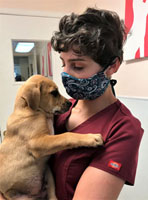
VetnCare staff 288
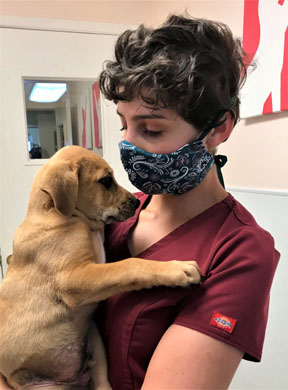
VetnCare photo
Veterinary assistants, like the one pictured, help bring in and take out animals from the clinic while their owners wait outside. Restrictions to stop the spread of COVID-19 have affected almost every aspect of veterinary medicine from care protocols to staffing and revenue.
Three months since the first case of COVID-19 was diagnosed in the United States, veterinary practices, deemed an essential service, mostly have stayed open. Carrying on has not been easy. Data collected from more than 2,500 practices in the U.S. found they reported an average 8% drop in daily revenue and 12% drop in the number of daily invoices from March 15 to April 30. The information was collected by VetSuccess, a veterinary data company.
The backdrop explains why: Since early February, the novel coronavirus has infected more than 1 million Americans and killed more than 60,000, according to the U.S. Centers for Disease Control and Prevention. Physical-distancing rules and forced closures of nonessential businesses, tactics to stem transmission, have put millions out of work.
Interviews by the VIN News Service with a variety of veterinary team members in the U.S. show a profession grappling with abrupt and profound changes. But underscoring the diverse nature of veterinary practice even during ordinary times, the experiences run a gamut. Some report having reduced hours or closing completely. Some have laid off staff or asked for volunteers to work less or not at all. Some have, at least initially, experienced days or weeks of greater demand and higher-than-average transactions. Here are six snapshots from the trenches.
Things change day to day for a co-owner of two Michigan practices
Even as cases of COVID-19 were escalating steeply nationwide in March, "things were fine" at Dr. Andy Rollo's two practices in the Detroit suburbs. Conditions can change in a day, though, he discovered.
Michigan Gov. Gretchen Whitmer announced restrictions on veterinary care March 31, defining essential and nonessential services. The next day, the only sale at the smaller of Rollo's two practices was a single bag of dog food.
"Everyone was freaking out," Rollo said of the veterinary team. Should they even show up tomorrow? They wanted to know. (For the record, he told them yes.)
Dr. Andy Rollo 288
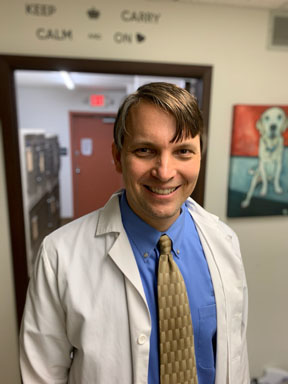
Photo by Dr. Tim Guild
Dr. Andy Rollo, who co-owns two practices in the Detroit suburbs, is using federal Paycheck Protection Program loans to avoid layoffs.
Essential services include preventing the transmission of infectious diseases, such as vaccinating for leptospirosis, a bacterial disease transmissible to humans that is spread through the urine of infected animals. Nonessential veterinary care, as defined by the governor's directive, encompasses treatment and procedures not needed to save an animal's life, prevent infectious disease or alleviate serious pain. Therefore, Rollo said, "I had to cancel 30 or 40 spays and neuters." When such operations are allowed again, he noted, "I'll have quite the backlog."
As co-owner of two companion animal practices located 18 miles apart, Rollo is witnessing the disparate experiences that are possible — and the exquisite vulnerability of smaller operations. Fully staffed, the larger of the two practices, Madison Veterinary Hospital, has four doctors and 31 other staff members. The smaller practice, Walnut Lake Animal Hospital, has one doctor a day (from the stable of four) and seven other staff members. Year-over-year revenue at the larger practice was down 12% in April, compared with a drop of 33% at the smaller practice. Because of a drop in client appointment requests, some staff were furloughed at the smaller clinic. Full-timers are hanging on to 32 hours a week at the larger hospital.
The smaller staffs at both hospitals are struggling to cover all tasks. Kennel attendants, for instance, sometimes help answer phone calls. There's no boarding right now, and "there's only so much cleaning they can do," Rollo explained. The usual receptionists, who have more extensive training, worried about the capabilities of the fill-ins. He reassured them that the kennel attendants would be responsible only for responding with the practice name and providing basic information. More complicated queries they would refer to an experienced client-service representative.
To help meet payroll while client visits are down, Rollo and his partner applied to the U.S. Small Business Administration for assistance through the Paycheck Protection Program (PPP), which was created on March 30. They signed up both practices for PPP, which provides funds to pay wages via loans that can be forgiven if the recipient avoids laying off personnel for a specified period. That involved a frustrating weekend — April 4 and 5 — of trying to submit applications while an overtaxed bank website repeatedly crashed.
"We had to get to the front of the line," said Rollo, worried at the time that the $349 billion allotted by Congress would run out before their application got through. He was right. The program ran out of funds on April 16, but another $310 billion was approved by Congress for applications starting again April 27.
Rollo reported that both practices have been approved for PPP funds, $50,000 for the larger practice and $8,000 for the smaller one. He and his partner applied for additional relief from the SBA's Economic Injury Disaster Loan program. Their application is pending.
Rollo bought into Madison in March 2018 and into Walnut Lake in January 2019. With two years of strong growth and both clinics fully staffed, Rollo was feeling positive. He had plans for a remodel at the larger practice. Then the pandemic hit. Now the plans are on hold.
"I just take it day to day," he said. "I'm going to say something different next week than this week."
The constant change, worries about staff and a bad bout with the flu around Christmas has, paradoxically, made Rollo more thankful than before.
"I was talking to my business partner yesterday about how I wake up, take a deep breath [and remind myself], ‘I can do this. I'm alive,' " he said. "I didn't do that a month ago."
The community counts on a Kansas practice to stay COVID-19-free
Dr. Melissa Detweiler
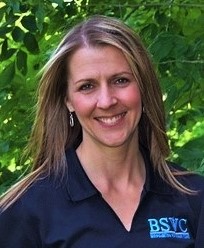
Photo courtesy of Dr. Melissa Detweiler
A small animal veterinarian, Dr. Melissa Detweiler practices in rural Kansas. The first case of COVID-19 didn't appear in her county until April 27.
In a rural Kansas town supported by farming and manufacturing, an hour's drive north of Topeka, Dr. Melissa Detweiler feels like she's living in "a bubble" because the first case of COVID-19 in her county did not appear until April 27. Detweiler is an associate in a companion animal practice in Sabetha co-owned by her husband, Dr. Kurt Detweiler, with another veterinarian. Kurt Detweiler also co-owns and works in a large animal practice located in the city of Bern, a 15-minute drive northwest.
Detweiler said neither practice has experienced a decrease in appointments during the past two months.
"I think we're in a little bit of a denial here," she said. "The last recession didn't hit us as bad as [it hit] others. Our employees in their 20s and 30s say, ‘Ehhh, it'll be fine.' And farmers are always worried about income. So this moment is no different."
Kansas Gov. Laura Kelly issued a stay-at-home order March 28 that closed many local businesses, but the farming and manufacturing sectors — the region is a hub for pet-food manufacturing — have as yet been unaffected.
Detweiler understands that that could change instantly should an illness occur. She believes that a confirmed case of COVID-19 on the production floor of a factory could result in a whole-facility closure, similar to a pork plant shutdown in South Dakota on April 12.
If the number of local COVID-19 cases started to climb, Detweiler said there is a plan in place for teams at the two veterinary practices to be kept separate, with Detweiler and her husband at one hospital, the other co-owner manning the other. The Sabetha practice is better equipped to handle small animal cases, but "the Bern office would suffice in the short term," Detweiler explained. If both closed, it would be devastating to the locals, she added.
"Our nearest emergency-only clinic is 90 miles away," she said. "We don't have the option of closing up and not seeing appointments."
With a single case of COVID-19 reported in the community, sometimes Detweiler says her concern about infection makes her feel out of sync with what the neighbors are feeling. Some locals see the effects of stay-at-home orders in declining demand for corn and soybeans, beef and dairy, and the production-line components that their factories produce.
"There's a lot of frustration in our community, because they see the [financial] effects ... and it's easy to say this doesn't make sense and we need to get everybody back moving," Detweiler said.
Revenue is down, but pets still need care in a New York City practice
Lisa Braunstein Zola
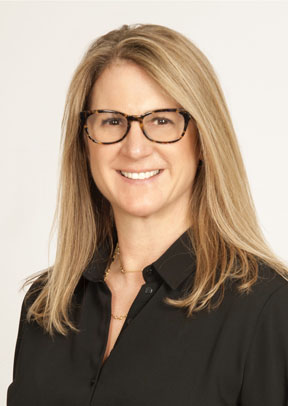
Photo courtesy of Lisa Braunstein Zola
Lisa Braunstein Zola, who manages a clinic on Manhattan's Upper East Side, said she fights staff panic with a positive attitude. New York City is the epicenter of the pandemic, with 29% of the country's cases as of May 1.
To Lisa Braunstein Zola, manager and co-owner of University Animal Hospital on the Upper East Side, Manhattan feels like a whole different place from the metropolis where she's worked for more than 30 years. Her state is the nation's epicenter of the pandemic, in the news every day, with 29% of the country's cases as of May 1.
"Most of our clients left Dodge, packed up their kids and got out of town," Braunstein Zola said, with parents responding to the March 16 closure for the year of schools. "This is an extremely affluent, family-oriented community, so it feels a bit like it does in the summer," when locals leave for summer homes in the Hamptons and on the Jersey Shore.
Revenue has been up and down for the practice. For year-over-year revenue, Braunstein Zola said the practice was up in January and February, and they "held their own" in March despite being down. April, however, was a big drop: 50%. At the same time, average invoices are "significantly higher" than usual, she said, because the visits are for urgent matters, not routine elective care. "[P]eople are coming in because their pets really need veterinary care," Braunstein Zola said.
To respond to the fall-off in demand, the hospital — which Braunstein Zola helped found and to which she later sold a majority stake to the corporate group AmeriVet Veterinary Partners — has reduced its hours of operation.
"The staff hours are down one-third to one-half, depending on the area of the hospital they work in," Braunstein Zola said. Doctors also are working reduced hours. Where four doctors covered a shift before the pandemic, one or two work now. One associate, worried about catching the virus, is staying home. Another associate is doing the same in order to care for children who are out of school.
"Our staff is in a panic," Braunstein Zola said. "I'm doing my best to reassure them. The reduced hours are a sacrifice we're all going to make, and we can come back bigger and stronger. Running around here with a positive attitude is helping."
Keeping a positive attitude has been easier, she said, with help from corporate headquarters and regular teleconferences with other hospitals "to troubleshoot" as a group. She particularly was impressed by an idea from higher-ups to offer mail-order in place of in-clinic pickup for prescriptions and pet food.
"It's been a tremendous benefit to mail out our own refills of medications as opposed to hemorrhaging revenue to online pharmacies," she said. "We've never done that before, and it never occurred to me to do it." Clinic staff have been proactively calling clients when their pet's prescriptions are due for renewal. Braunstein Zola said clients are thrilled to hear they can avoid curbside/front-door pickup.
Consolidating staff and inventory is helping a California hospital group
Dr. Andrew Moffatt 288

VetnCare photo
Dr. Andrew Moffatt, CEO of VetnCare in California's Bay Area, said having eight hospitals in the group has allowed the company to adapt to the challenges of the COVID-19 pandemic.
VetnCare, a group of eight general-practice hospitals in California's Bay Area, has bucked national trends, according to its CEO, Dr. Andrew Moffatt. He said his company has seen a 4% increase in year-over-year revenue since a stay-at-home order was issued March 19.
Moffatt credits the adaptability possible in a multi-hospital group as one of several reasons his group is going strong.
"We were able to pivot and implement some strategic changes very quickly," Moffatt said, "just to give us the best chance of getting the business through the storm."
Moffatt started with temporarily closing smaller sister hospitals located near larger ones. Many staff members from closed hospitals are working at the larger ones, helping to manage curbside services and keeping those hospitals open regular hours for client convenience, he said.
Having fewer open hospitals meant the company also could consolidate inventories.
"We had almost double the inventory to work through, and all our hospitals were able to freeze new orders from mid-March through the first two weeks of April," he said.
VetnCare also adopted group-wide telemedicine, an initiative that Moffatt said might have taken six months to implement during quieter times but was up and running in just a few weeks. "I think if we weren't pressed by this need, we would have spent more time deliberating the pros and cons," Moffatt said, "and stretched out a telemedicine pilot program."
He observed that single independent hospitals may have much less flexibility and adaptability. "A lot of smaller hospitals in the area have had to close," he said. "Maybe the practice owners or their teams felt they needed to self-quarantine, or someone had COVID-19 and they had to quarantine the whole facility."
By virtue of staying open, VetnCare has been able to benefit from outside trends. Moffatt speculates that an increase in pet adoptions during the pandemic coupled with fewer open clinics may be fueling an increase in new clients, average client transactions and revenue, even though the overall number of visits is falling.
The benefit of staying open illustrates the cost of closing.
Jeff Sanford, who teaches practice management topics at the University of Georgia College of Veterinary Medicine, points out that a veterinary practice is an asset, and assets keep their value if they are maintained. If they stop serving clients and close their doors completely, that asset loses value over time.
"Unless you're sick, there's no reason to close," Sanford counsels veterinarians. "If you close, especially if other practices around you are open, that's problematic. Maybe you'll hang onto that 40% due for their vaccines later in the year, but you'll lose a bunch of clients who need essential care now."
Relief work temporarily dried up for this Minnesota company
Michelle D. Krasicki-Aune 288
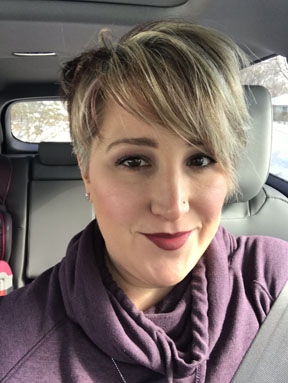
Photo courtesy of Michelle D. Krasicki-Aune
Veterinary technician Michelle D. Krasicki-Aune runs a business that deploys relief technicians to clinics in the Minneapolis-St. Paul area. Her message to these key team members: "Keep doing all the good you do, but remember to take care of yourself."
Flexibility doesn't solve the financial problem for Michelle D. Krasicki-Aune's business, Vet Teams. The company deploys relief veterinarian technicians to clinics in the Minneapolis-St. Paul area.
When the pandemic hit, "[p]ractices canceled shifts with us," Krasicki-Aune said. "Part of it was the fear that we're mobile and increased the risk of exposing team members. I completely see that."
She said 80% of shifts were canceled in the days after Minnesota's stay-at-home order was issued March 16. May is worse: 95% of shifts scheduled for the month have been canceled.
Before the pandemic, Vet Teams' future looked bright. "I was on track to do what I'd done [in 2019 revenue] by the six-month mark of 2020," Krasicki-Aune said. "This has completely spoiled that."
One of her plans was to start placing veterinary assistants and relief veterinarians. "This has put me back to five years ago when I started," she lamented, "when I never paid myself."
Nevertheless, Krasicki-Aune has started giving her own remaining relief hours to one of her employees, whom she counseled to file for COVID-related unemployment if her hours dropped too low to provide a sustainable income. She has relaxed monthly hourly requirements for part-time employees so they can try to achieve full-time hours at other jobs.
Krasicki-Aune has been concerned for years about burnout among veterinary technicians. She worries that the added stress of the pandemic will drive more colleagues from the profession. Practice owners will need to take extra care in the coming months to hold onto their teams, she said.
"Thank you for doing what you do, technicians," she said. "Keep doing all the good you do, but remember to take care of yourself."
A ban on spays and neuters closed this Colorado practice
Dr. Annelise Cummings 288

Photo courtesy of Dr. Annelise Cummings
Dr. Annelise Cummings had to close her spay and neuter practice in Colorado for more than a month due to COVID-19 restrictions. Now, allowed to reopen, she's down one veterinary technician, who is quarantined after being exposed to the virus.
As the owner of a practice that exclusively provides low-cost spay and neuter surgeries, Dr. Annelise Cummings had no choice but to close when Gov. Jared Polis banned all nonessential services after March 23.
"My biggest emotion was, and still is, fear of how long it would last," Cummings, owner of NoCo Spay & Neuter, said in mid-April. "It was horrible."
Her two staff members elected to be laid off, and applied for unemployment. Cummings promised to rehire them if and when she reopens. She donated unopened packages of surgery gloves, exam gloves, surgery masks and disposable gowns to health-care workers.
"The only good thing that came out of it was, we reached out to our [animal] rescue partners," she said, "and were able to do 33 spays and neuters the weekend before the ban went into effect."
With her husband employed full-time and able to work from home, and her only major business expenses rent and utilities, Cummings chose to ride out the ban. One option for staying open would have been to buy the equipment necessary to become a full-service hospital, "but that's not what I started my business to do," she said.
Cummings' fortunes changed again on Monday, when Gov. Polis' new "Safer at home" mandate took effect. The new rules allow businesses to gradually reopen during the course of the week, with "non-critical offices" allowed to resume operations on May 4. The Colorado Veterinary Medical Association spelled out what that means for veterinary practices: The statewide ban on elective surgeries and procedures is over, but social distancing is mandatory and personal protective equipment must be preserved.
Cummings started limited practice again April 29 with spay and neuter procedures on five feral cats, but there's a hitch: A relative of her main veterinary technician is sick and needs to be tested for COVID-19 — meaning the technician is under self-quarantine until the results are back.
"He can't even get tested until Thursday, so my technician can't return until at least next week," Cummings said. "There is no way we want to get others sick."